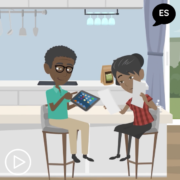How Nurses Can Promote Patient Education?
This year has marked a significant shift in the way the average person receives care. In an attempt to protect patients from the coronavirus, more care facilities are conducting virtual appointments through telehealth as often as possible. But what does this mean for patient empowerment and education?
While there are many benefits to telemedicine, this medium of care can make it difficult to educate cancer patients and address all of their concerns. However, nurses can play a significant role in promoting patient education whether it be through virtual platforms or face-to-face.
Patient empowerment through education is a key element of care. To make the most of any situation, nurses must understand their role in promoting patient education and develop useful strategies for educating patients across a variety of mediums.
Here’s what you should know.
The Role of Nurses in Patient Education
When President Trump declared a national emergency because of the coronavirus pandemic, it initiated a legal expansion of telehealth services for millions of Americans. This brought about an explosion in telehealth options that had previously been more common for rural patients. Now, however, everyone from cancer to behavioral health patients is making frequent use of these systems, often with great results.
The importance of telehealth for the treatment of issues like behavioral health has reshaped the role that many nurses have in patient care, but it has not damaged the effectiveness of care. In fact, the majority of healthcare providers said telehealthcare was the same if not higher quality than traditional care.
To maintain this quality, the emphasis has been placed on forging bonds of effective communication, empowered by patient education. Among the many tasks of nurses in this process are the following:
Communicating with a physician while providing in-home care.
Especially in cancer treatment, strictly telehealth options are not going to cut it. Often, nurses will continue with in-home care strategies, which then require information to be relayed back to a primary physician.
Part of the job of a nurse is to maintain clear standards with the patient and the doctor, keeping them both informed on current health status and next steps. Patient education in this role can be a powerful tool in ensuring that the patient feels secure and cared for.
Facilitating consultations.
Additionally, nurses will act as facilitators of new telehealth communications with physicians either socially distancing or quarantining. This helps to keep all parties safe while assisting patients in using new tech.
Patients will come into an office, be screened by a nurse, have their vitals checked, and then begin a telehealth conference with a physician. Nurses must be prepared to answer a series of questions about the process and what can be expected, including assuaging concerns about the quality of telehealthcare. Patient education may be the most empowering form of care a nurse can offer in virtual visits like these.
Navigating new technologies.
With shifts in care processes come the need for nurses to adapt to new technologies. This can be difficult and requires flexibility and consistent communication with colleagues and patients.
In this role, it may be helpful for nurses to educate patients roughly on the ways new tech has changed care provisions and data management. Patients don’t necessarily need to navigate these systems themselves, but by educating them on how their data is stored and handled, you can help empower their security.
All these roles and more require nurses to educate patients regarding the care they are receiving, what they can expect, and the way systems have changed in what has become the new normal of health care. Nurses are often expected to serve as a communication bridge between physician and patient. Effectively achieving this means keeping the patient informed and up-to-date.
Luckily, there are some beneficial strategies to help nurses manage this colossal task.
Strategies for Promoting Patient Education
No matter the time or the health crisis at hand, nurses are some of the most important figures in patient education. These care professionals are the focal points of communication between physicians and patients, and as such will play significant roles in ensuring all patient questions get answered.
Whether you are operating through telehealth or in-person care, nurses can better promote patient education with the following strategies:
1. Maintain an empathetic approach.
No matter what role you end up occupying as a nurse, compassion and empathy will help you maintain a high standard for patient education. Empathy is essential to healthcare, as it allows providers to step into the shoes of patients and work out from there how best to help patients.
Empathy allows nurses to ask themselves what they would want to know at any point in the care process. They can then relay that info back to the patient in the form of quality education. By maintaining an empathetic approach, nurses put the human aspect back into healthcare.
Self-compassion is necessary for nurses as well, as they face high-stress environments that can quickly lead to burnout. Take some time for yourself to relax and de-stress.
2. Empower your patients.
Information is one of the most empowering tools that nurses have to offer patients. With proper health care education, patients are positioned to make informed decisions about their care options, giving them greater decision-making and financial power.
Nurses are instrumental in providing this empowerment. You can take your patients through questions, policies, standards, and even payment scenarios to keep them as informed as possible. In doing so, you will raise the standard for care through education.
3. Integrate tech solutions.
Wherever possible, introducing patients to new technologies can be a successful method of promoting education. From applications to facility patient portals, showing your patients how to navigate helpful technologies will put the power into their hands. Patients will be able to review their own records and information and can even track some of their own metrics through apps and wearables.
Healthcare tech is a teach-a-man-to-fish situation. If nurses educate patients on how to use the tools available to them, they will be better positioned to make valuable decisions regarding their own health.
With each of these strategies, nurses will be better positioned to provide patient education regardless of the role pandemic shifts have them play. Empathy will be key, then empowerment and tech solutions can offer patients unprecedented levels of quality in the outcome of their care. Promote patient education however you can to ensure that healthcare needs are met even in the middle of a public health crisis.
Additional Resources
Beau Peters is a creative professional with a lifetime of experience in service and care. As a manager, he’s learned a slew of tricks of the trade that he enjoys sharing with others who have the same passion and dedication that he brings to his work. When he is not writing, he enjoys reading and trying new things.










